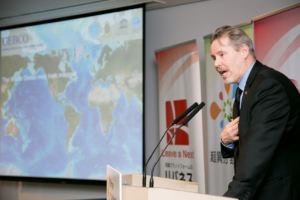Pumping new value out of uncharted waters
2018.10.10 What kind of value can be created in the future from new technological developments in the ocean? The speakers discussed the future of the ocean from their own perspectives.
What kind of value can be created in the future from new technological developments in the ocean? The speakers discussed the future of the ocean from their own perspectives.
Challenging the seafloor with diverse technologies
The DeSET project supports the development of innovative technologies with the goal of completing 1001 TP3T of seafloor topographic maps by 2030, when less than 151 TP3T is currently known. The applicants gathered to engage in a controversial discussion at the team formation camp held at the end of August. At the Super Interdisciplinary Conference, representatives of the three teams that emerged from this camp presented their respective developments. The first presenter, Shohei Ito of Full Depth Corporation, aimed to build a platform for autonomous exploration by underwater robots. He said that he hopes to create a system consisting of ship robots, underwater stations, and inexpensive underwater robots equipped with power generation, non-contact power supply, and communication functions, and deploy them in the world's oceans to create a situation where exploration is always underway. The next speaker, Toyoki Sasakura of AquaSound Inc. has developed a technology that speeds up the oscillation of ultrasonic sounding equipment (sonar) by tens to hundreds of times. While focusing on this technology, the company is also aiming to develop a seafloor exploration technology that can be used for a wide range of applications, from shallow to deep sea, by combining the use of biological agents and depth estimation technology using satellite images. Unlike the previous two, Michihiro Shonai of Ecomot Corporation focuses on the development of super-resolution technology for existing topographic maps using AI rather than actual observation. Using a set of known fine and coarse maps as a teacher, he will create highly accurate inferred topographic maps for areas where only coarse maps are available. During the development of the technology, the inferred topographic maps will also be measured and feedback will be provided to improve the accuracy of the estimation.
Build a knowledge base and accelerate value creation
In the latter half of the symposium, two speakers from the Marintec Grand Prix, which accelerates the creation of new industries based in the ocean, took the stage. Hiroki Yamanaka of Ryukoku University spoke about underwater organism monitoring technology using environmental DNA and his vision for a new paradigm in biological resource research by spreading this technology around the world. Jun Ogura of Nagahama Institute of Bio-Science and Technology talked about the development of medical adhesives derived from the Japanese common squid, and shared with the audience his dream of industrializing the results of basic research. In the future, the establishment of a knowledge base of detailed seafloor topographic maps and the increase in human knowledge of the oceans should accelerate the utilization of various resources that are not yet fully exploited. In this trend, the attractiveness of the ocean as a research field will no doubt increase.

